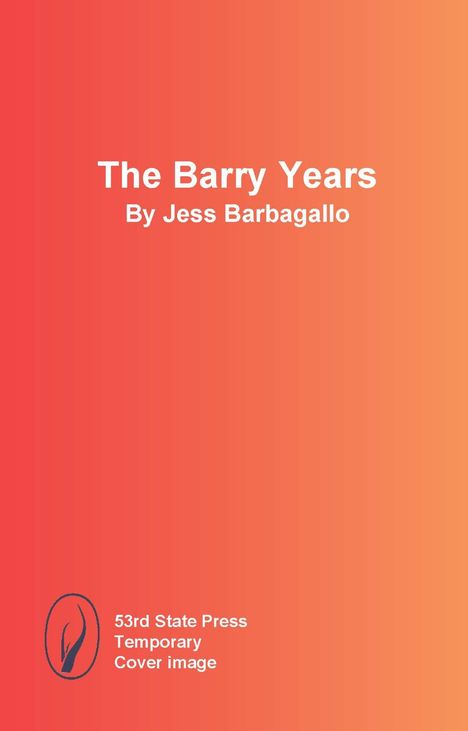Jess Barbagallo: The Barry Years, Kartoniert / Broschiert
The Barry Years
- Two Plays
Lassen Sie sich über unseren eCourier benachrichtigen, sobald das Produkt bestellt werden kann.
- Verlag:
- Theatre Communications Group, 09/2026
- Einband:
- Kartoniert / Broschiert
- Sprache:
- Englisch
- ISBN-13:
- 9798992283952
- Umfang:
- 205 Seiten
- Gewicht:
- 183 g
- Maße:
- 178 x 127 mm
- Stärke:
- 11 mm
- Erscheinungstermin:
- 22.9.2026
- Hinweis
-
Achtung: Artikel ist nicht in deutscher Sprache!
Ähnliche Artikel
Klappentext
Rich in swagger, invention, mischief and heat...the crispness and bite of Barbagallo's text is, recursively, a love letter to writing itself. --- Time Out NY
The Barry Years includes three plays from writer-director-performer Jess Barbagallo, who has shaped an entire generation of New York theater with his tender haywire wit. My Old Man and Other Stories follows Barry---a forlorn Tom Waits impersonator with a water-stained floor and romance-induced insomnia---through a sequence of episodic scenes featuring emotional incompetents seeking love without compromise. An homage to small-town decay and reduced expectations, My Old Man and Other Stories is at once lambent with unrequited longing and crisp as the mechanics of life.
Barry returns in Weekend at Barry's / Lesbian Lighthouse , a pair of back-to-back episodes of television-as-theater, the second knocked-off from (knocked up by?) the first. Now a forty-something cultural worker whose career-averse lifestyle has led him to a personal and professional dead end, Barry bounces between questionable jobs and even more questionable lovers. In language that is winking, layered, [and] dazzling (Helen Shaw, Vulture ), Barbagallo delivers a devastatingly precise and zany send-up of the contemporary art world that teeters on that silver highwire between despair and hilarity.
Weekend at Barry's: Greatest Hits---featuring Barry but narrated by Biv, your resident narrator, dreamer, and shit-starter---is kind of like a spin-off. And also a bunch of short stories. Anyway, it asks us to reexamine our formalities, in Biv's words. Learning to love in this way is a form of radicalism because it means that perverse love---that is the love we do against the structures that seek to organize us in brutality---is the only love.





